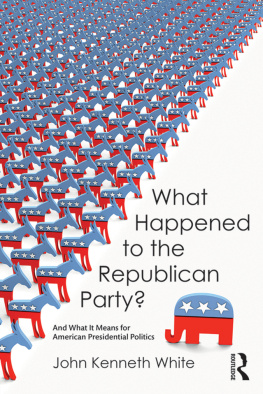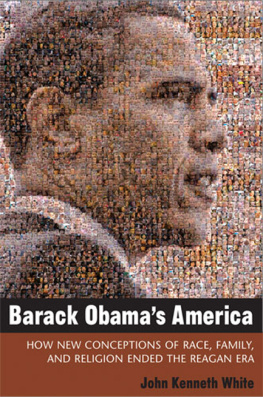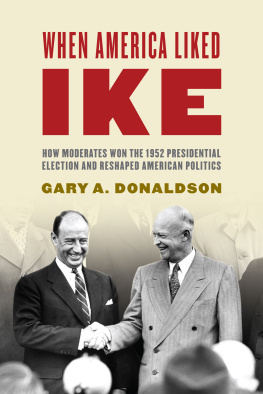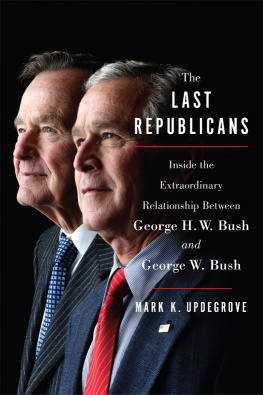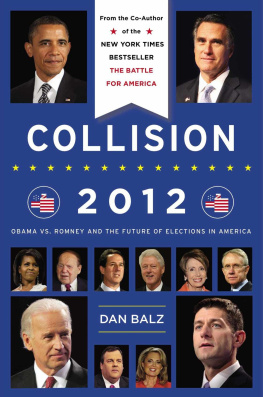What Happened to the Republican Party?
The Grand Old Partyonce moderate and even magnanimoushas fallen into a prison of its own making when it comes to presidential politics. Republicans may be having a heyday in the Congress, but their prospects for the 2016 presidential election arent greatand wont improve unless and until they break out of their intellectual and ideological straightjackets and start speaking to where the American public lives: geographically, culturally, and politically.
John Kenneth White is a Professor of Politics at the Catholic University of America and the author of several books on political parties and the U.S. presidency.
What Happened to the Republican Party?
And What It Means for American Presidential Politics
John Kenneth White
First published 2016
by Routledge
711 Third Avenue, New York, NY 10017
and by Routledge
2 Park Square, Milton Park, Abingdon, Oxon, OX14 4RN
Routledge is an imprint of the Taylor & Francis Group, an Informa business
2016 Taylor & Francis
The right of John Kenneth White to be identified as author of this work has been asserted by him in accordance with sections 77 and 78 of the Copyright, Designs and Patents Act 1988.
All rights reserved. No part of this book may be reprinted or reproduced or utilised in any form or by any electronic, mechanical, or other means, now known or hereafter invented, including photocopying and recording, or in any information storage or retrieval system, without permission in writing from the publishers.
Trademark notice: Product or corporate names may be trademarks or registered trademarks, and are used only for identification and explanation without intent to infringe.
ibrary of Congress Cataloging-in-Publication Data A catalog record for this book has been requested
ISBN: 978-1-61205-921-1 (hbk)
ISBN: 978-1-61205-922-8 (pbk)
ISBN: 978-1-315-67529-9 (ebk)
Typeset in Sabon
by Apex CoVantage, LLC
For Everett Carll Ladd (19371999), a mentor who continues to inspire, and for Matthew R. Kerbel, another colleague, mentor, and friend whose insights helped shape this book.
Contents
During the writing of this volume, I have incurred more than the usual number of obligations. I am deeply indebted to Jennifer Knerr, Vice President and Associate Publisher, at Paradigm Publishers for believing in this work and helping to shape it. My colleagues, Matthew R. Kerbel at Villanova University and William Crotty at Northeastern University, copiously read several drafts of the manuscript and offered valuable insights. I am deeply grateful to them. I am also beholden to my students at the Catholic University of America, who heard several versions of the arguments presented here and helped me to refine my thesis. I also owe a great thanks to Anne Lesher, reference librarian at Mullen Library at the Catholic University of America, for her prompt responses to my many requests.
In many ways, this work relies on prior assistance I received for previous works. In particular, I owe a great debt to the late Richard B. Wirthlin, pollster for Ronald Reagan. Our many conversations about the Republican Party during the Reagan years are reflected in this book. The late Everett C. Ladd at the University of Connecticut taught me a great deal about the utility of polling data and that political science should be accessible to every interested reader. I hope that is reflected in this work. As always, my family remains a constant support.
Preface
Why Republicans?
Some years ago, in a book titled The Losing Parties , Philip A. Klinkner maintained that minority parties matter because the means they use to extricate themselves from their difficulties shapes the future discourse of American politics: [P]arties out of power merit observation because an election loss may exert a strong influence on their ensuing behavior. For example, losing parties are more likely than winning parties to innovate and reform themselves and the party system and to raise new issues. Defeat provides them with a powerful motivation for changing their personnel, organizational structure, internal party procedures, and platforms since past methods have failed to achieve victory. In-parties, following both the need for consistency and the adage if it aint broke, dont fix it, seem less disposed to change themselves.
From this vantage point, it makes sense to focus on the Republican Party, which is todays minority party in presidential politics . Since 1992, no Republican candidate has garnered more than 300 electoral votes, or won more than 51 percent of the popular vote. Moreover, the only Republican president to serve since Bill ClintonGeorge W. Bushis an anathema to many Americans. Even now, years after leaving the White House, George W. Bush remains unpopular, as several recent polls illustrate:
- 69 percent blame Bush for the current economic problems facing the United States;
- 61 percent say that Bushs decision to wage war in Iraq was the wrong thing to do;
- 51 percent blame Bush for the situation in Iraq, as the Iraqi government has failed to find a sustaining coalition to help keep the country from breaking apart;
- 47 percent answer a lot when asked if the Bush administration was to blame for the difficulties the middle class has faced in the past decade;
- 43 percent believe Bush will be viewed by historians as either a below average or poor president.
In a presidential nation such as ours, presidents become public faces of the parties they represent.
Any reader of this book will surely ask: Arent Democrats torn apart by internal dissensions? Dont they have an unpopular president who is tarnishing their image? The answer to both questions is undeniably yes. A rising populismbest symbolized by Massachusetts U.S. senator Elizabeth Warrenopposes the business-friendly third way politics of the Bill Clinton years. Seeking the presidency, Clinton labeled himself a New Democratone whose first reliance would not be on the federal government but would focus instead on giving people the tools they need to make the most of their lives. The 1992 party platform crystallized the partys new thinking:
We offer a new social contract based neither on callous, do-nothing Republican neglect, nor an outdated faith in programs as the solution to every problem. We favor a third way beyond the old approachesto put government back on the side of citizens who play by the rules. We believe that by what it says and how it conducts its business, government must once again make responsibility an instrument of national purpose. Our future as a nation depends upon the daily assumption of personal responsibility by millions of Americans from all walks of lifefor the religious faiths they follow, the ethics they practice, the values they instill, and the pride they take in their work.
Despite such outbursts, Clinton stuck to his New Democrats formulationthe obvious inference being, of course, that there were old Democrats stuck in the rigid bureaucracies of the New Deal past.
Critics derided the so-called New Democrat philosophy as not being a philosophy at all. Historians James MacGregor Burns and Georgia J. Sorenson argued that Clintons never-ending pursuit of Reagan Democrats left the Democratic Party philosophically bereft. Today, New Democrats have taken a back seat to party activists who want government to do more in the wake of the 2008 financial collapse and the Great Recession that followed. Populists, like Elizabeth Warren, see government as a necessary corrective force to big businesses and the too-big-to-fail banks that ran roughshod over too-timid (or nonexistent) federal regulations. Says Warren:

